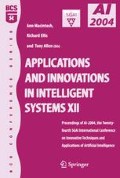Abstract
Within incident management an important aspect is the analysis of log files describing traces of incident management processes and the errors made in them. Automated support of such an analysis can be helpful. In this paper some results are shown on automated support for analysis of errors in traces of incident management. For such traces it can be checked automatically which dynamic properties describing good functioning hold and which fail. The potential of the approach is shown in the formal analysis of a given empirical trace. The approach can also be applied in conjunction with simulation experiments.
Access this chapter
Tax calculation will be finalised at checkout
Purchases are for personal use only
Preview
Unable to display preview. Download preview PDF.
References
Austin, J.L. How to do things with words. Oxford University Press, 2nd edition, 1976.
Brazier, F.M.T., Treur, J. Compositional modelling of reflective agents. International Journal of Human-Computer Studies, vol. 50, 1999, pp. 407–431.
Breuer, K., Satish, U. Emergency Management Simulations-An approach to the assessment of decisionmaking processes in complex dynamic environments. In Jose J. Gonzalez (eds), From modeling to managing security: A system dynamics approach, HoyskoleForlaget, 2003, pp. 145–156.
Brown, S. M., Santos Jr., E., Banks, S. B., Stytz, M. R. Intelligent interface agents for intelligent environments. In: Proceedings of the 1998 AAAI Spring Symposium on Intelligent Environments, 1998, pp. 145–147.
Burghardt, P. Combined Systems: The combined systems point of view. In: Carte, B., Walle, B. van der (eds.), Proceedings of the International Workshop on Information Systems for Crisis Response and Management’ 04, Brussels, Belgium. 2004.
Etzioni, O., Hanks, S., Weld, D., Draper, D., Lesh, N., Williamson, M., An approach to planning with incomplete information. In: Proc. 3rd Int. Conf. on Principles of Knowledge Representation and Reasoning, 1992, pp. 115–125.
Fargier H., Lang J., Martin-Clouraire R., Schiex T. A constraint satisfaction framework for decision under uncertainty. In: Proc. of the 11th Int. Conf. on Uncertainty in Artificial Intelligence, 1995, pp. 167–174.
Inspectie Brandweerzorg en Rampenbestrijding, Vliegtuigongeval Vliegbasis Eindhoven 15 juli 1996, SDU Grafische Bedrijf, The Hague, 1996.
Inspectie Brandweerzorg en Rampenbestrijding, Dakota-incident Waddenzee 1996, SDU Grafische Bedrijf, The Hague, 1997.
Jonker, CM., Letia, I.A., Treur, J. Diagnosis of the dynamics within an organisation by trace checking of behavioural requirements. In: Wooldridge, M., Weiss, G., and Ciancarini, P. (eds.), Agent-Oriented Software Engineering, Proc. of Second Int Workshop AOSE’01. Lecture Notes in Computer Science, vol. 2222. Springer Verlag, 2002, pp. 17–32.
Jonker, CM., Treur, J. Compositional verification of multi-agent systems: a formal analysis of pro-activeness and reactiveness. International. Journal of Cooperative Information Systems, vol. 11, 2002, pp. 51–92.
Jonker, CM., Treur, J., and Wijngaards, W.C.A., A Temporal Modelling Environment for Internally Grounded Beliefs, Desires and Intentions. Cognitive Systems Research Journal, vol. 4, 2003, pp. 191–210.
Lee, M.D.E. van der, Vugt, M. van. IMI — an information system for effective multidisciplinary incident management. In: Carté, B., Walle, B. van der (eds.), Proceedings of the International Workshop on Information Systems for Crisis Response and Management’ 04, Brussels, Belgium. 2004.
Ridder, M. de, Twenhöfel, C. The design and implementation of a decision support and information exchange system for nuclear emergency management in the Netherlands. In: Carlé, B., Walle, B. van der (eds.), Proceedings of the International Workshop on Information Systems for Crisis Response and Management’ 04, Brussels, Belgium. 2004.
Author information
Authors and Affiliations
Editor information
Editors and Affiliations
Rights and permissions
Copyright information
© 2005 Springer-Verlag London Limited
About this paper
Cite this paper
Hoogendoorn, M. et al. (2005). Formal Analysis of Empirical Traces in Incident Management. In: Macintosh, A., Ellis, R., Allen, T. (eds) Applications and Innovations in Intelligent Systems XII. SGAI 2004. Springer, London. https://doi.org/10.1007/1-84628-103-2_17
Download citation
DOI: https://doi.org/10.1007/1-84628-103-2_17
Publisher Name: Springer, London
Print ISBN: 978-1-85233-908-1
Online ISBN: 978-1-84628-103-7
eBook Packages: Computer ScienceComputer Science (R0)

